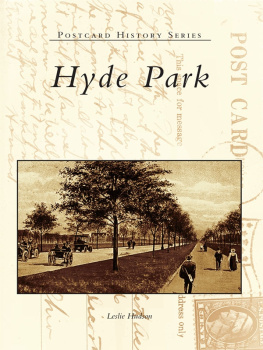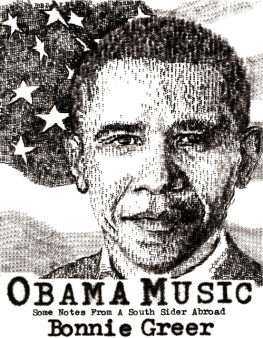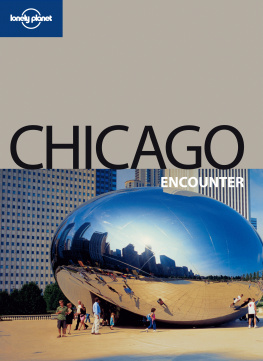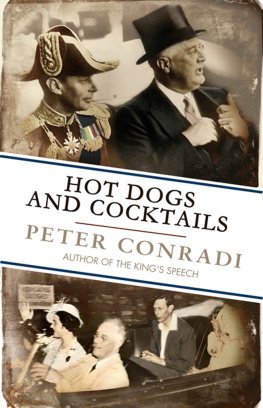CULTURE OF OPPORTUNITY
CULTURE OF OPPORTUNITY
Obamas Chicago:
The People, Politics, and Ideas of
Hyde Park
Rebecca Janowitz

CULTURE OF OPPORTUNITY. Copyright 2010 by Rebecca Janowitz. All rights reserved, including the right to reproduce this book or portions thereof in any form. For information, address: Ivan R. Dee, Publisher, 1332 North Halsted Street, Chicago 60642, a member of the Rowman & Littlefield Publishing Group. Manufactured in the United States of America and printed on acid-free paper.
www.ivanrdee.com
Library of Congress Cataloging-in-Publication Data:
Janowitz, Rebecca, 1953
Culture of opportunity : Obamas Chicago : the people, politics, and ideas of Hyde Park / Rebecca Janowitz.
p. cm.
Includes bibliographical references and index.
ISBN 978-1-56663-833-3 (cloth : alk. paper)
1. Hyde Park (Chicago, Ill.)Social conditions. 2. Hyde Park (Chicago, Ill.)Politics and government. 3. Obama, BarackHomes and hauntsIllinoisChicago. I. Title.
F548.68.H9J365 2010
977.3'1dc22
2010001143
To Gayle and Morris Janowitz,
wonderful parents and exemplary citizens
CONTENTS
PREFACE
The Chicago neighborhood of Hyde Park has attracted unusual attention since Barack Obamas ascent to the presidency began. Many observers speculate about the communitys contribution to his success. In telling this story, the advantage I have is twofold: I began watching Hyde Park very closely more than forty years ago, and I have been an active participant in its community life.
Although I have served on the boards of various neighborhood organizations, the only group I ever led is the Fifty-seventh Street Childrens Book Fair committee. That volunteer post, which I held on my own or in partnership for twenty-two years, afforded me a comprehensive introduction to Hyde Parks cultural and social scene. On the one hand, the neighborhood generously supported the venture. Individuals contributed wonderful ideas: Why not have a giant version of Wheres Spot? so that a small child can actually walk into a favorite book? On the other hand, when we sent a college student dressed as Snow White to reward third-graders who had successfully struggled through summer school with gift sertificates for books, a local reporter criticized us for discriminating on the basis of academic achievement.
My interest in Hyde Park politics is long-standing. I have known many of the politicians and other public figures described in these pages. My political experience is at the grassroots level and includes passing petitions, packing meetings, and watching polls. When Barack Obama once described me as a political person, I took it as a compliment.
Hyde Park has provided many people, including Obama, with unusual opportunities. I try to describe the political and social culture that produces these opportunities and how it developed. Hyde Parks culture is rooted in its history: decisions made fifty and a hundred years ago still shape the community.
My greatest regret about the book as it stands is the number of amazing Hyde Parkers who are absent from its pages. This reflects no lack of affection for them or respect for their accomplishments. But the goal here is a portrait of the neighborhood, not an encyclopedia.
I could not have completed this book without help from many friends. Jim Dispensa provided me with useful statistics on the public schools. Dori Jacobsohn helped me understand Gertrude Abercrombie. Toni Preckwinkle took time from the campaign trail, during her run for Cook County Board president, to answer my questions. Irene Sherr shared insights about Paul Cornells work in the areas of parks and planning. Kenneth Sawyer patiently outlined the complex story of Hyde Parks numerous theological seminaries.
Oswelda Badal, Tara Baldridge, Jack Cella, Barbara Flynn Currie, Cydney Fields, Jackie Grimshaw, Philip Hanson, Prentiss Jackson, Bradley Jonas, Elizabeth Kirby, Ray Lodato, Rosa McCullagh, Sue Purrington, Sara Spurlark, and Mimi Zeltzerman generously shared personal experiences. Some read sections of the manuscript and offered thoughtful suggestions. Stephen Treffman read every chapter, caught many mistakes and acted as a coach and sounding board.
I owe special thanks to my mother, Gayle Janowitz, the kindest of copy editors, and Daniel Silverfarb, the severest of critics. My sons, Aaron and Daniel Collard, enrich my life every day and in different ways keep their fathers spirit alive.
R. J.
Chicago
January 2010
CULTURE OF OPPORTUNITY
ONE
LIFE IN HYDE PARK
When Barack Obama won the 2008 presidential race, the staff of 57th Street Books hung a colorful hand-lettered sign in their small front window reading Congratulations to Our Longtime Customer. 57th Street Books is a branch of Hyde Parks venerable Seminary Cooperative Bookstore, an independent business owned by its members. The Seminary Co-op has 54,000 members, 17,000 of whom live on the South Side of Chicago, and a worldwide reputation as a scholarly bookstore. Members have access to more than 230,000 volumes at the stores three locations in Chicago but cannot buy a cup of coffee at any of them. Hyde Park is an austere place. There is almost no nightlife. But the neighborhood has excellent facilities for writing books. An aspiring writer may buy paper, toner, and computers at Office Depot, one of Hyde Parks handful of big box retailers. The would-be author may do research at numerous well-organized libraries and special collections. Once his or her book is published, a Hyde Park author hopes the senior staff of the Seminary Co-op will choose to place it on the prestigious front table. This local honor means a great deal to Hyde Parkers: the books on the front table are the best of the best, scholarly books expected to become classics and to influence thinking in more than one field.
The front table is located in the bookstores main branch, the basement of a beautiful, dilapidated Protestant seminary. Customers enter through huge carved doors, pass through a medieval entryway, and walk down a steep staircase. One of the walls by the stairs is covered, as if by wall paper, with a vast and varied collection of posters and flyers announcing seminars, lectures, opportunities to participate in or object to research, and an endless array of protest meetings. The bookstore itself is made up of many small rooms, lined floor to ceiling with bookshelves, all arranged in a confusing pattern. The front table has its own place center stage in one of the first rooms. Almost everyone who comes into the bookstore pauses to check its contents. The front table does not have a sign; it has never needed one.
No president of the United States has shopped at the bookstore while in office. When President Clinton wanted to stop by, the Secret Service looked at the maze of tiny rooms and said no. The last time Barack Obama was spotted as a customer, he was a presidential candidate. He stopped by 57th Street Books with one of his daughters to help her find a book. His excited fellow customers yearned to speak to him but restrained themselves and sent all their friends breathless e-mails.
Nobel Prize winners, Supreme Court justices, famous scholars and writers, and thousands of serious readers belong to the Seminary Co-op. Like Obama, they all get careful attention from Jack Cella, the manager, who remembers what everyone reads and knows most of the books in the store. There is absolutely no parking available for anyone.

Next page






